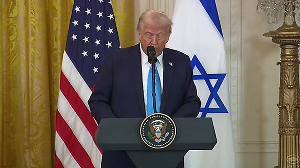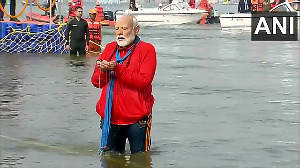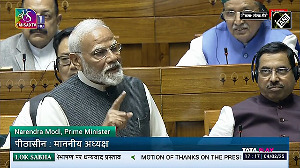The five permanent members of the UN Security Council and Germany have reached an agreement on enhancing sanctions against Iran after the US, Britain and France gave up their insistence on much stronger measures to punish Tehran for its failure to abandon its uranium enrichment programme.
The five veto-yielding powers -- the US, Britain, France, Russia and China -- have remitted the draft prepared on Wednesday evening to their capitals from where, diplomats said, they are likely to get a positive response.
But, President Mahmoud Ahmadinejad retaliated by saying that UN Security Council has 'no legitimacy'.
"Today the enemies of the Iranian people are seeking to use the Security Council to prevent the progress and development of Iran," he said in his latest speech. "But the Security Council has no legitimacy among the peoples of the world," the IRNA agency quoted him as saying.
Once the governments approve the details, they would circulate the draft among the ten non-permanent members who are openly expressing their anger at being left out of the loop during the discussions.
But despite this, they are not expected to block the measure though they may delay adoption of the resolution for a day or so.
The resolution, which is expected to be introduced shortly and may be voted late this week or early next week, expands the lists of individuals and entities connected with Iranian nuclear programme whose assets the Council would like the member states to freeze.
It bans export of arms by Iran and asks countries to apply vigilance and restraint on arms exports to Tehran and on transit through their territories individuals whose assets are to be frozen.
It would also ask states not to make fresh commitments grants and concessional loans to Iran.
"We have an agreement in principle based on some additional changes that were introduced and presented on Thursday by some delegations," acting US Ambassador Alejandro Wolff said.
"There are some among us who still want to double-check with the captials on some of the details of this deal," Russia's Ambassador Vitaly Churkin said, adding that they were hoping of a positive response from all the governments.
The US and allies would have preferred much broader and tougher sanctions to force Iran to abandon its uranium enrichment programme but had to settle for much less in face of strong opposition from China and Russia who have commercial links with Iran.
China had originally objected to the expanded three-page list of individuals and entities whose assets are to be frozen but its diplomats said Beijing agreed to the draft resolution in the interest of compromise and sending strong message to Iran.
Iranian President Mahmoud Ahamdinejad's statement that he plans to address the 15-member Security Council the day it takes up the resolution has evoked considerable interest and concern among diplomats.
However, several say that Ahmadinejad has the right to put forward his country's case and they see no reason to deny him the opportunity despite his belligerent statements including that Iran would continue its uranium enrichment programme for peaceful purposes.
However, it was not known whether Iran has put forward a formal request.
But the United States and its allies believe that Iranian enrichment programme is geared towards producing nuclear weapons.
Even as the major powers were finalizing the draft, Ahmadinejad warned that such a resolution would widen the rift and asserted that they would not succeed in isolating the Iranian nation.
Israeli Foreign Minister Tzipi Livni and Defence Minister Amir Peretz met Secretary General Ban Ki-moon on Wednesday and expressed concern about Iranian nuclear programme especially in the context of Ahmadinejad calling for wiping out the Israeli State and denying Holocaust.






 © 2025
© 2025